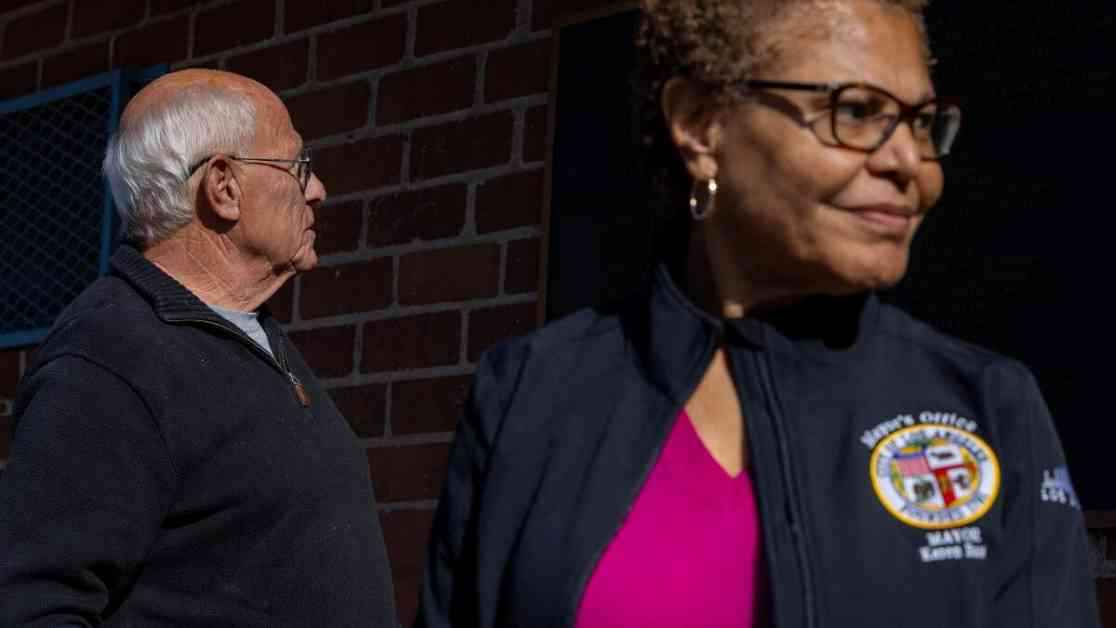Los Angeles Mayor Karen Bass recently faced intense backlash over her decision to pay chief wildfire recovery officer, Steve Soboroff, a hefty sum of $500,000 for just 90 days of work. The news of this exorbitant salary, funded by charitable organizations, sparked outrage among Palisades residents and public figures, who deemed it “obscene” and a “money grab.” However, after much criticism, Mayor Bass made a surprising reversal, announcing that Soboroff would now work for free to avoid any distractions from the crucial recovery efforts.
Public Outcry and Political Fallout
When Mayor Bass initially appointed Steve Soboroff as her wildfire recovery czar, it seemed like a strategic move to bolster her administration’s response to the devastating fires. As a well-respected civic leader and real estate developer with deep ties to the fire-affected community, Soboroff was expected to bring much-needed expertise and guidance to the recovery efforts. However, the revelation of his staggering salary sparked a wave of criticism, with residents, city officials, and even political figures expressing their outrage over what they saw as an unjustifiable payout.
One of the most vocal critics was L.A. City Councilmember Monica Rodriguez, who condemned the decision to pay Soboroff $500,000 for his services. She labeled the amount as “offensive” and questioned the use of philanthropic funds for such extravagant compensation. The backlash was further amplified by President Trump’s envoy for special missions, Ric Grenell, who highlighted the stark contrast between Soboroff’s high salary and the volunteer efforts of many others involved in the recovery process.
In response to the growing discontent, Mayor Bass swiftly made a U-turn, announcing that both Soboroff and another real estate executive, Randy Johnson, would now work without compensation. This move aimed to quell the rising tensions and refocus attention on the crucial task of rebuilding and restoring confidence in the fire-ravaged neighborhoods.
Transparency and Accountability Concerns
The controversy surrounding Soboroff’s pay also raised questions about transparency and accountability in the allocation of recovery funds. While the charitable organizations funding his salary remained unnamed, concerns were raised about whether donors were fully aware of how their contributions were being utilized. City Councilmember Rodriguez emphasized the need for greater clarity and oversight to ensure that the donated funds were being used effectively and ethically.
Additionally, the lack of detailed information about Soboroff’s compensation and responsibilities had fueled speculation and frustration among residents directly impacted by the wildfires. Larry Vein, a Pacific Palisades resident whose home suffered smoke damage, criticized the perceived financial motives behind Soboroff’s initial salary arrangement. Similarly, Steve Danton, who lost his home in the fires, expressed disappointment and mistrust in the leadership’s handling of the recovery efforts, calling it a “crisis of leadership.”
Despite the controversy and public outcry, Soboroff stood by his qualifications and commitment to the recovery mission. He defended his extensive experience and dedication to the cause, highlighting the sacrifices he had made to focus solely on the rebuilding efforts. Soboroff’s transition to working pro bono signaled a willingness to prioritize the community’s needs and restore faith in the recovery process.
As the city of Los Angeles navigates the challenges of post-wildfire recovery, the episode surrounding Steve Soboroff’s compensation serves as a reminder of the importance of accountability, transparency, and community engagement in times of crisis. By listening to public feedback, addressing concerns, and demonstrating a commitment to ethical stewardship of resources, city leaders can rebuild trust and foster a sense of unity in the face of adversity.
The controversy over Soboroff’s pay marked the second time in a little over a week that Bass reversed a decision after criticism. Last week, she said Pacific Palisades would reopen to the public, prompting widespread frustration from residents and City Councilmember Traci Park over crime and safety risks. The mayor later announced the neighborhood would remain closed.
Pacific Palisades resident Larry Vein, whose home suffered smoke damage, criticized Soboroff’s salary arrangement Saturday morning, saying no one should be overseeing the recovery for “financial gain.”Steve Danton, who lost his home in the Palisades fire and is living in a temporary apartment in Marina del Rey, had an even stronger reaction, calling Soboroff’s compensation a “money grab.”Danton, whose family has lived in Pacific Palisades since 1999, said the city had experienced a “crisis of leadership” since the fires broke out. The lack of transparency around Soboroff’s salary only added to the community’s frustrations, he said.


